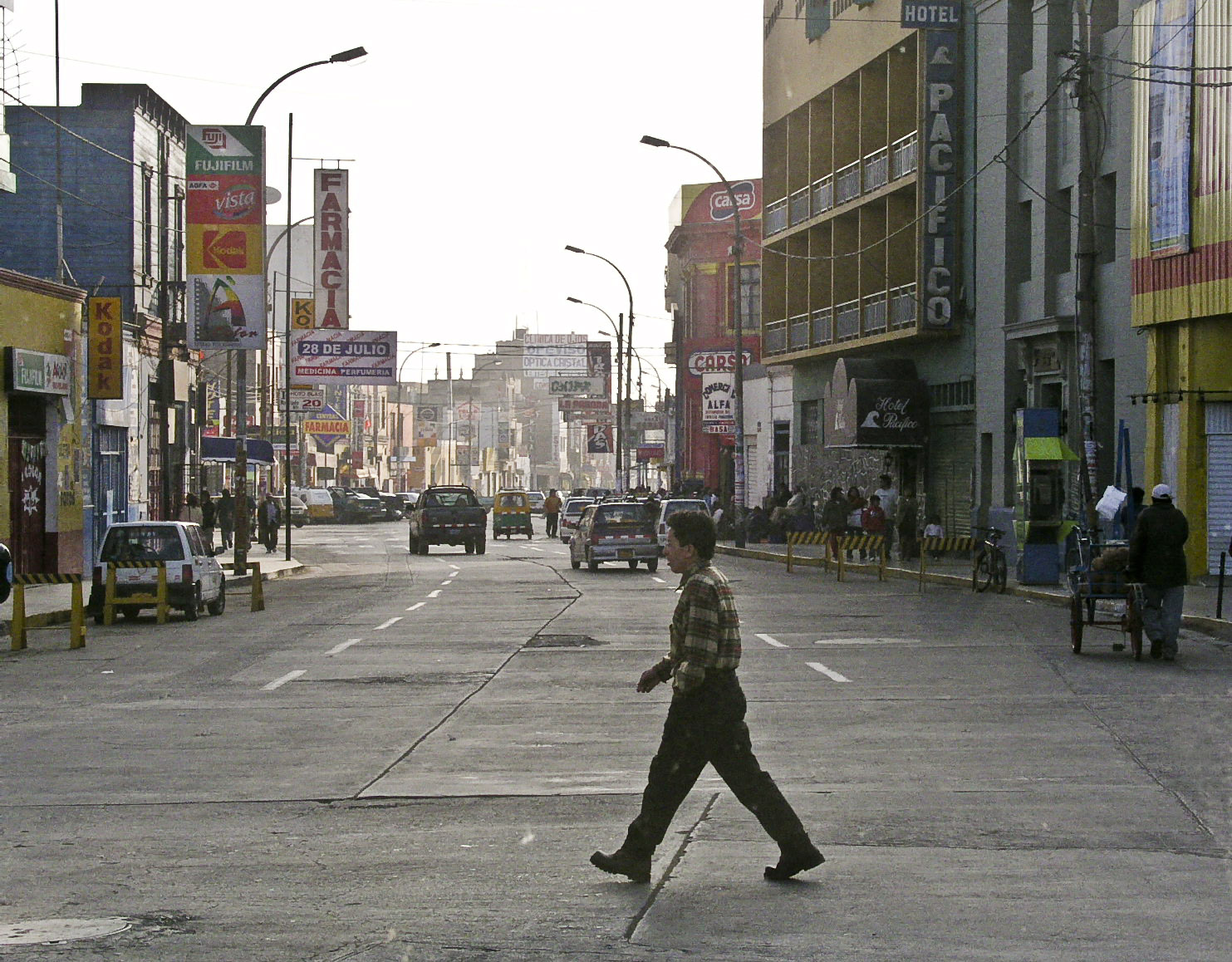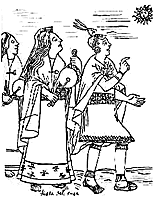|
Alfredo Torero
Alfredo Augusto Torero Fernández de Córdova (September 10, 1930 in Huacho, Lima Region, Peru – June 19, 2004 in Valencia, Spain) was a Peruvian anthropologist and linguist. He was a student at the National University of San Marcos, from which he graduated in the early 1960s, and then traveled to France, where he continued his doctorate at the University of Paris. There he obtained a doctorate in 1965, under the direction of the linguist André Martinet, with his thesis ''Le puquina, la troisième langue générale du Pérou''. Alfredo Torero came to prominence thanks to his article "The Dialects of Quechua" in 1964 and ranks among the founders of Andean linguistics. Much of his work is characterised by bringing into his linguistic investigations also cultural aspects of the Andean peoples. Besides Quechua and Aymara, he researched extinct languages such as Mochica and Puquina. The present classification of the Quechua language family is based fundamentally on his analy ... [...More Info...] [...Related Items...] OR: [Wikipedia] [Google] [Baidu] |
Huacho
Huacho () is a city in Peru, capital of the Huaura Province and capital of the Lima Region. Also is the most populated city of the Lima Region and Norte Chico. It is located 223 feet (68 metres) above sea level and 148 km north of the city of Lima. The city is located on the Pan-American Highway and it is close to the Lachay National Reserve, so it has extensive vegetation and wildlife. Geography Settled on the bottom of a wide bay, its climate is wet and appealing. In the surrounding areas there are rice, cotton, sugarcane and different grain fields. This fact has allowed the rise of a rather important cotton industry, as well as cotton and oil factories. Within its natural landscape, its salt mines and its beaches (such as El Paraíso ) are of great interest. Huacho was one of the main trade centers of northern Lima. History Under the viceroy of Francisco de Toledo, who decided to group the '' ayllus'' of the Indians who were established in that area into reductio ... [...More Info...] [...Related Items...] OR: [Wikipedia] [Google] [Baidu] |
Quechuan Languages
Quechua (, ; ), usually called ("people's language") in Quechuan languages, is an indigenous language family spoken by the Quechua peoples, primarily living in the Peruvian Andes. Derived from a common ancestral language, it is the most widely spoken pre-Columbian language family of the Americas, with an estimated 8–10 million speakers as of 2004.Adelaar 2004, pp. 167–168, 255. Approximately 25% (7.7 million) of Peruvians speak a Quechuan language. It is perhaps most widely known for being the main language family of the Inca Empire. The Spanish encouraged its use until the Peruvian struggle for independence of the 1780s. As a result, Quechua variants are still widely spoken today, being the co-official language of many regions and the second most spoken language family in Peru. History Quechua had already expanded across wide ranges of the central Andes long before the expansion of the Inca Empire. The Inca were one among many peoples in present-day Peru who already sp ... [...More Info...] [...Related Items...] OR: [Wikipedia] [Google] [Baidu] |
National University Of San Marcos Faculty
National may refer to: Common uses * Nation or country ** Nationality – a ''national'' is a person who is subject to a nation, regardless of whether the person has full rights as a citizen Places in the United States * National, Maryland, census-designated place * National, Nevada, ghost town * National, Utah, ghost town * National, West Virginia, unincorporated community Commerce * National (brand), a brand name of electronic goods from Panasonic * National Benzole (or simply known as National), former petrol station chain in the UK, merged with BP * National Car Rental, an American rental car company * National Energy Systems, a former name of Eco Marine Power * National Entertainment Commission, a former name of the Media Rating Council * National Motor Vehicle Company, Indianapolis, Indiana, USA 1900-1924 * National Supermarkets, a defunct American grocery store chain * National String Instrument Corporation, a guitar company formed to manufacture the first resonator gui ... [...More Info...] [...Related Items...] OR: [Wikipedia] [Google] [Baidu] |
2004 Deaths
This is a list of deaths of notable people, organised by year. New deaths articles are added to their respective month (e.g., Deaths in ) and then linked here. 2022 2021 2020 2019 2018 2017 2016 2015 2014 2013 2012 2011 2010 2009 2008 2007 2006 2005 2004 2003 2002 2001 2000 1999 1998 1997 1996 1995 1994 1993 1992 1991 1990 1989 1988 1987 See also * Lists of deaths by day * Deaths by year {{DEFAULTSORT:deaths by year ... [...More Info...] [...Related Items...] OR: [Wikipedia] [Google] [Baidu] |
1930 Births
Year 193 ( CXCIII) was a common year starting on Monday (link will display the full calendar) of the Julian calendar. At the time, it was known as the Year of the Consulship of Sosius and Ericius (or, less frequently, year 946 ''Ab urbe condita''). The denomination 193 for this year has been used since the early medieval period, when the Anno Domini calendar era became the prevalent method in Europe for naming years. Events By place Roman Empire * January 1 – Year of the Five Emperors: The Roman Senate chooses Publius Helvius Pertinax, against his will, to succeed the late Commodus as Emperor. Pertinax is forced to reorganize the handling of finances, which were wrecked under Commodus, to reestablish discipline in the Roman army, and to suspend the food programs established by Trajan, provoking the ire of the Praetorian Guard. * March 28 – Pertinax is assassinated by members of the Praetorian Guard, who storm the imperial palace. The Empire is a ... [...More Info...] [...Related Items...] OR: [Wikipedia] [Google] [Baidu] |
Linguists From Peru
Linguistics is the scientific study of human language. It is called a scientific study because it entails a comprehensive, systematic, objective, and precise analysis of all aspects of language, particularly its nature and structure. Linguistics is concerned with both the cognitive and social aspects of language. It is considered a scientific field as well as an academic discipline; it has been classified as a social science, natural science, cognitive science,Thagard, PaulCognitive Science, The Stanford Encyclopedia of Philosophy (Fall 2008 Edition), Edward N. Zalta (ed.). or part of the humanities. Traditional areas of linguistic analysis correspond to phenomena found in human linguistic systems, such as syntax (rules governing the structure of sentences); semantics (meaning); morphology (structure of words); phonetics (speech sounds and equivalent gestures in sign languages); phonology (the abstract sound system of a particular language); and pragmatics (how social co ... [...More Info...] [...Related Items...] OR: [Wikipedia] [Google] [Baidu] |
Peruvian Anthropologists
Peruvians ( es, peruanos) are the citizens of Peru. There were Andean and coastal ancient civilizations like Caral, which inhabited what is now Peruvian territory for several millennia before the Spanish conquest in the 16th century; Peruvian population decreased from an estimated 5–9 million in the 1520s to around 600,000 in 1620 mainly because of infectious diseases carried by the Spanish. Spaniards and Africans arrived in large numbers in 1532 under colonial rule, mixing widely with each other and with Native Peruvians. During the Republic, there has been a gradual immigration of European people (especially from Spain and Italy, and in a less extent from Germany, France, Croatia, and the British Isles). Chinese and Japanese arrived in large numbers at the end of the 19th century. With 31.2 million inhabitants according to the 2017 Census, Peru is the fifth most populous country in South America. Its demographic growth rate declined from 2.6% to 1.6% between 1950 and 2000 ... [...More Info...] [...Related Items...] OR: [Wikipedia] [Google] [Baidu] |
Cuzco
Cusco, often spelled Cuzco (; qu, Qusqu ()), is a city in Southeastern Peru near the Urubamba Valley of the Andes mountain range. It is the capital of the Cusco Region and of the Cusco Province. The city is the seventh most populous in Peru; in 2017, it had a population of 428,450. Its elevation is around . The city was the capital of the Inca Empire from the 13th century until the 16th-century Spanish conquest. In 1983, Cusco was declared a World Heritage Site by UNESCO with the title "City of Cuzco". It has become a major tourist destination, hosting nearly 2 million visitors a year. The Constitution of Peru (1993) designates it as the Historical Capital of Peru. Spelling and etymology The indigenous name of this city is . Although the name was used in Southern Quechua, its origin is found in the Aymara language. The word is derived from the phrase ('rock of the owl'), related to the city's foundation myth of the Ayar siblings. According to this legend, Ayar Awq ... [...More Info...] [...Related Items...] OR: [Wikipedia] [Google] [Baidu] |
Inca
The Inca Empire (also known as the Incan Empire and the Inka Empire), called ''Tawantinsuyu'' by its subjects, ( Quechua for the "Realm of the Four Parts", "four parts together" ) was the largest empire in pre-Columbian America. The administrative, political and military center of the empire was in the city of Cusco. The Inca civilization arose from the Peruvian highlands sometime in the early 13th century. The Spanish began the conquest of the Inca Empire in 1532 and by 1572, the last Inca state was fully conquered. From 1438 to 1533, the Incas incorporated a large portion of western South America, centered on the Andean Mountains, using conquest and peaceful assimilation, among other methods. At its largest, the empire joined modern-day Peru, what are now western Ecuador, western and south central Bolivia, northwest Argentina, the southwesternmost tip of Colombia and a large portion of modern-day Chile, and into a state comparable to the historical empires of Eura ... [...More Info...] [...Related Items...] OR: [Wikipedia] [Google] [Baidu] |
Puquina
Puquina (or Pukina) is a small, putative language family, often portrayed as a language isolate, which consists of the extinct Puquina language and Kallawaya, although it is assumed that the latter is just a remnant of the former mixed with Quechuan. The ''Qhapaq simi'', which was spoken by the Inca elite, in contrast to the Quechuan-speaking commoners, is thought to be related, as well as the Leco isolate language. They are spoken by several native ethnic groups in the region surrounding Lake Titicaca ( Peru and Bolivia) and in the north of Chile. Puquina itself is often associated with the culture that built Tiwanaku. Background Remnants of the single, ancestral Puquina language can be found in the Quechuan and Spanish languages spoken in the south of Peru, mainly in Arequipa, Moquegua and Tacna, as well as in Bolivia. There also seem to be remnants in the Kallawaya language, which may be a mixed language formed from Quechuan languages and Puquina. ( Terrence Kaufman ... [...More Info...] [...Related Items...] OR: [Wikipedia] [Google] [Baidu] |
Lima Region
The Department of Lima () is a department and region located in the central coast of Peru, the ''seat of the Regional Government'' is Huacho. Lima Province, which contains the city of Lima, the country's capital, is located west of the Department of Lima; this province is autonomous and not under the jurisdiction of the Regional Government. Geography The department of Lima is bordered by the departments of Ancash on the north, Huánuco, Pasco, and Junín on the east, Huancavelica on the southeast, Ica on the south, and the Pacific Ocean and the Lima Province on the west. The department has a coastal and an Andean zone, and has a great diversity of natural regions: the Coast or ''Chala'' (0 to 500 meters above sea level) up to the ''Janka'' or ''Mountain range'' ( es, Cordillera, over 4800 meters). The predominating regions are the ''Yunga'' (500 to 2300 meters above sea level) and ''Quechua'' (2300 to 3500 meters) Points of interest Lachay National Reserve The L ... [...More Info...] [...Related Items...] OR: [Wikipedia] [Google] [Baidu] |

.png)

.jpg)

